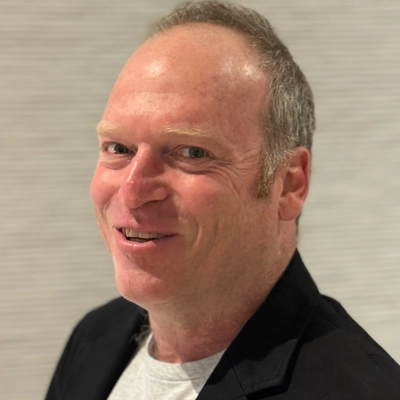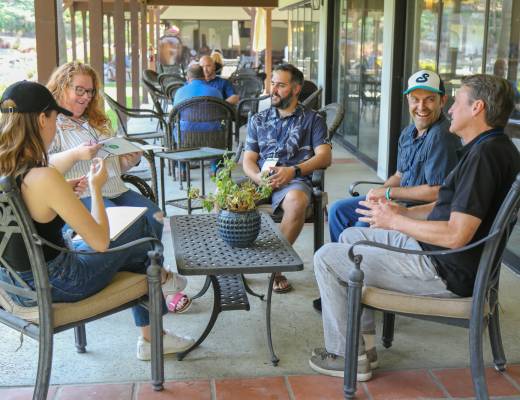Effective mentorship is a crucial element of professional development. We asked industry experts to share an example of a time when they mentored or supported a colleague’s professional development. Here are the approaches they took and the advice they’d give to others who want to be effective mentors. Discover practical strategies for nurturing talent and fostering growth.
- Transform Trust Through Ownership
- Foster Independence in Decision-Making
- Leverage Strengths for Authentic Growth
- Cultivate Confidence Through Collaborative Elevation
- Create Conditions for Strategic Learning
- Nurture Growth Through Consistent Support
- Empower Through Immersive Experience
- Guide Mindset Shifts for Leadership
- Provide Context for Financial Acumen
- Develop Leaders Through Belief
- Shape Mindset Beyond Technical Skills
- Boost Confidence Through Guided Responsibility
- Encourage Growth in Safe Environments
- Build Trust and Foster Community
- Illustrate Concepts Through Practical Application
15 Tips for Effective Mentorship from Experienced Leaders
Transform Trust Through Ownership
I’ve been coaching executives for over 30 years, and one of my most impactful mentoring experiences involved a Chief Marketing Officer who was completely destroying his team’s trust. During his 360-degree assessment, every single team member said they didn’t trust him because he would publicly blame them when presentations went wrong.
The breakthrough came when I had him implement what I call the “ownership rule” — take responsibility for things that go wrong, give credit when things go right. We practiced this during his next quarterly review meeting where his team’s market analysis had significant errors. Instead of pointing fingers like before, he told the CEO, “This is on me, and here’s how we’ll fix it.”
The shift was immediate. His team started taking more risks and bringing him problems early instead of hiding them. Within three months, his 360-degree scores on trust went from 2.1 to 4.3 out of 5. One team member told me, “He finally has my back instead of using it as a target.”
The key is addressing the specific behavior that’s breaking trust, not generic leadership advice. I’ve seen this pattern across financial services, pharma, and tech — once leaders start defending their people publicly and owning failures privately, everything changes.
 Bill Berman
Bill Berman
CEO, Berman Leadership
Foster Independence in Decision-Making
I’ve learned that mentoring is not just about guidance but also about helping someone develop the confidence to navigate complexity without needing constant reassurance.
I mentored a colleague a few years ago who had great instincts but lacked follow-through because he second-guessed himself at every decision point. At first, I thought I was helping him by affirming his choices. I’d give quick feedback, validate his thinking, and keep things moving. But over time, I realized that approach was backfiring. He became dependent on my input. So, instead of growing more confident, he waited to be told.
That’s when I shifted how I mentored. I stopped giving immediate answers and instead asked my clients, “If I weren’t here, what would you do, and why?”
I wanted them to think through the problem on their own and trust their process. After they explained, we’d walk through the logic together to sharpen it. Slowly, the questions they brought me started turning into proposals. Soon they stopped looking for approval and started owning outcomes.
That shift taught me that effective mentorship isn’t about creating dependency but about creating decision capacity. If someone only knows how to lead when you’re watching, they’re not ready yet. But if they can explain, defend, and refine their thinking in your absence, you’ve done your job.
I’ve learned that mentorship isn’t about having the answers but teaching them to carry the weight without waiting for a go signal.
 Jeff Mains
Jeff Mains
Founder and CEO, Champion Leadership Group
Leverage Strengths for Authentic Growth
I mentored a team member by focusing on her natural abilities rather than trying to fix perceived weaknesses. She had excellent candidate assessment skills and strong supply chain knowledge but struggled with formal client presentations.
Instead of forcing presentation training, I helped her leverage her strength in one-on-one relationship building. We restructured her client interactions from formal presentations to consultative conversations. This allowed her to ask strategic questions and share insights naturally.
The results were immediate. Her client satisfaction improved dramatically. She developed genuine confidence that strengthened her business relationships. Placement success increased because she was operating from her strengths.
This approach taught me that effective mentoring amplifies what people do well. When you help someone excel in their natural abilities, they often develop confidence that improves other areas organically. The focus should be on maximizing existing capabilities rather than forcing improvement in difficult areas.
The impact extends beyond individual performance. When team members see their strengths valued and developed, engagement increases across the organization. People feel more confident taking on challenging projects. They’re more willing to share ideas and collaborate.
This mentoring philosophy has become central to how we develop talent. It creates authentic professional growth while building stronger team dynamics.
 Friddy Hoegener
Friddy Hoegener
Co-Founder | Head of Recruiting, SCOPE Recruiting
Cultivate Confidence Through Collaborative Elevation
One of the most rewarding experiences I’ve had was mentoring a junior team member who came into my agency with raw creative talent but very little confidence or strategic direction. She had the instincts of a great brand thinker but lacked clarity on how to translate her ideas into structured campaigns or deliverables for clients.
Rather than simply assigning tasks or giving feedback in passing, I carved out 30 minutes a week for what we called “micro-strategy labs.” These were informal but intentional working sessions where we’d walk through a live client challenge together, break it into parts, and brainstorm potential frameworks or brand narratives. Over time, I noticed that her ideas not only sharpened but also began to come with context, rationale, and confidence.
My approach was rooted in collaborative elevation, treating mentorship not as hierarchy but as co-creation. I shared real tools and frameworks I use at Marquet Media and FemFounder, invited her to client meetings, and gave her ownership over small wins that could build momentum.
My advice to others who want to be effective mentors:
Don’t just tell someone how to do it — show them how to think. Create space for mistakes. Celebrate micro-wins. The best mentorship doesn’t create replicas of you — it reveals the brilliance in them. When you mentor with transparency and trust, you’re not just developing talent — you’re building leaders.
 Kristin Marquet
Kristin Marquet
Founder & Creative Director, Marquet Media
Create Conditions for Strategic Learning
One example stands out from my years leading global e-commerce teams and consulting for rapidly scaling businesses. A talented marketing manager at a multinational client sought to move into a broader digital leadership role but was struggling to gain confidence in cross-functional decision-making. In our mentoring sessions, I focused on two core areas: strategic context and operational exposure.
First, I ensured she understood not just the KPIs for her current campaigns, but the strategic goals behind them. We reviewed how marketing objectives aligned with the company’s commercial targets and technology roadmap. I encouraged her to ask questions in leadership meetings, to challenge assumptions, and to articulate her perspective clearly. This built her credibility as someone who could think beyond her functional silo.
Second, I provided opportunities for her to shadow cross-functional projects, particularly those involving tech and operations. I introduced her to key stakeholders and made space for her to present in joint sessions. As she gained hands-on experience with digital product launches and omnichannel initiatives, her confidence and influence grew rapidly.
The most valuable advice I can offer prospective mentors is to treat mentorship as a business partnership. Your role is not to prescribe answers, but to create the conditions for real business learning. Give your mentee access to strategic context and operational challenges, not just advice. Push them to see the business as a whole and to practice decision-making in real scenarios, even if it means letting them make mistakes.
In my experience, especially through our leadership development initiatives, the best mentors help people see beyond their current role and build relationships across the organization. Effective mentorship is measured not by how much you teach, but by how much your mentee grows in confidence, influence, and strategic contribution. This approach creates future leaders who are ready not only to execute, but to drive the business forward.
 Eugene Mischenko
Eugene Mischenko
President, E-Commerce & Digital Marketing Association
Nurture Growth Through Consistent Support
One of the most meaningful mentoring moments I’ve had was with a team member who came in incredibly talented but hesitant to speak up. You could see the potential — sharp thinker, great instincts — but they were holding back in meetings, second-guessing their ideas, and staying in execution mode instead of stepping into leadership.
Rather than push them into the spotlight, I took a slower approach. We had weekly one-on-ones, and I made space to ask not just what they were working on, but how they felt about it. I shared not only feedback but also my own early-career missteps — times I played it too safe or didn’t raise my hand when I should have. That gave them permission to be honest, and from there, we built a clear development track. I let them lead a small initiative, coached behind the scenes, and publicly acknowledged their wins in front of peers. Over six months, the shift was real. They went from contributor to confident lead, now mentoring others themselves.
The biggest thing I learned? Mentorship isn’t about fixing someone — it’s about creating the conditions where they can grow into who they already are. You don’t need to have all the answers. You just need to stay curious, be consistent, and actually care.
If you want to be an effective mentor, start by listening harder than you advise. Ask better questions. Share your failures. And give people chances to stretch, not just succeed. It’s not about building a mini version of you — it’s about helping them build the most expansive version of themselves.
That’s when real development happens. Not from a playbook, but from a relationship that makes growth feel possible — and safe.
 John Mac
John Mac
Founder, OPENBATT
Empower Through Immersive Experience
Mentorship is like gardening: nurture, give space, and trust the process.
A few years ago, one of my team members in sales struggled to speak up during sprint planning meetings. Her technical work was excellent, but when timelines felt tight or priorities were unclear, she stayed quiet instead of raising concerns. Rather than correcting her and giving advice, I asked if she’d like to co-lead the next sprint planning session with me. We held weekly sessions to discuss real client scenarios and important topics to address in upcoming meetings. I didn’t offer ready-made answers, but I created a comfortable environment where mistakes were allowed and not seen as a big issue.
We worked on organizing thoughts, anticipating questions, and delivering insights with clarity. Over time, I also assigned a few junior team members to work under her to develop leadership qualities. This experience gave her a significant boost; she started speaking up more often, and a few months later, she was mentoring a new team herself.
If you’re mentoring someone, don’t try to mold them into your style. Growth requires space, not pressure. Sometimes, what someone needs most is someone who believes in them when they’re struggling to believe in themselves. Emotional support paired with skill-building can unlock real transformation.
 Jignen Pandya
Jignen Pandya
CEO, Expert App Devs
Guide Mindset Shifts for Leadership
A couple of years ago, I coached a mid-career engineer transitioning into enterprise AI. The most impactful point in the journey was building a domain-specific retrieval-augmented generation (RAG) system for a global industrial client. Instead of diving into the tech stack, I instructed her to embed herself with the client’s operations team for two weeks — no coding, just listening.
That immersion enabled her to comprehend not just workflows but also the unstated friction points that are not reflected in data. From there, we collaboratively built a knowledge graph to map undocumented tribal knowledge and fine-tuned a multi-vector retriever to rank in terms of contextual relevance rather than lexical similarity. This experience fundamentally altered how she thought about AI: not as a model problem but as an organizational intelligence challenge.
If you want to be an effective mentor, resist the temptation to lead with tooling. Guide your mentee to ask: What information asymmetry are we addressing? Utilize both your tech-savvy and systems-thinking skills. Let them wrestle with ambiguity, and then show them how to organize chaos into coherence. Remember, mentorship isn’t about passing on knowledge; it’s about instilling judgment.
 Jonathan Garini
Jonathan Garini
Founder & CEO | Enterprise AI Strategist, FifthElement
Provide Context for Financial Acumen
I mentored a high-performing individual contributor who was being considered for team leadership but lacked management experience and confidence in leading others. My approach focused on providing safe opportunities to practice leadership skills while offering guidance about the mindset shifts required for successful transition from individual contributor to team leader.
The mentoring process included assigning them to lead specific projects with small teams, encouraging them to run training sessions for newer employees, and creating regular reflection sessions where we discussed leadership challenges and strategic thinking approaches. I also shared resources about management philosophy and connected them with other leaders who could provide different perspectives on effective team leadership.
Within a year, they successfully transitioned to a management role and have become an excellent team leader who now mentors others. My advice for effective mentoring is to focus on mindset development alongside skill building, helping mentees understand how their role and responsibilities change as they advance, rather than just teaching specific techniques. Leadership success requires thinking differently about work relationships and priorities, not just learning new skills, so mentoring must address these fundamental perspective shifts.
 John Pennypacker
John Pennypacker
VP of Marketing & Sales, Deep Cognition
Develop Leaders Through Belief
There was a young project manager on our team who had a brilliant eye for design but struggled with the financial side of projects — tracking budgets, managing change orders, and similar tasks. Instead of simply giving him a spreadsheet to fill out, I approached it differently.
My approach was to have him “shadow” me on a complex, high-stakes project. We would review the budget together every morning. I didn’t just tell him what to do; I explained the reasoning behind every financial decision — the risks, the long-term impact on profitability, and the client relationship. Over a few months, he progressed from seeing a budget as a chore to viewing it as a strategic tool.
My advice for others is this: effective mentorship isn’t just about giving advice; it’s about providing context and a real-world perspective. Don’t just tell them the answers; show them the process and the thinking behind the decisions. Give them a safe environment to make mistakes and learn from them. The goal is to make them self-sufficient, not dependent on you.
 Kiel Kellow
Kiel Kellow
Business Owner, Kellow Construction
Shape Mindset Beyond Technical Skills
A few years ago, I hired a clinical technician who had the right heart but lacked confidence and direction. He had been through recovery himself and was passionate about helping others — but he didn’t see leadership potential in himself. I saw it.
Instead of pushing him into a formal leadership role too quickly, I gave him ownership of a small program — peer mentorship. I let him lead, fail, adjust, and grow. I didn’t micromanage. I stayed present, asked the right questions, and reminded him often that leadership isn’t about titles — it’s about trust and consistency.
One day, after running his first group session solo, he walked into my office and said, “I finally feel like I’m not just surviving. I’m giving something back.”
Today, he’s one of our strongest program leaders. He mentors others and brings a level of credibility that no degree can fake.
My approach to mentorship? It’s not about fixing someone — it’s about holding space long enough for them to see what you already saw in them.
If you want to be a good mentor, listen more than you speak. Ask more than you tell. Give them chances, not just advice. And most importantly — walk with them, not above them.
You don’t develop people through pressure. You develop them through belief.
 Andy Danec
Andy Danec
Owner, Ridgeline Recovery LLC
Boost Confidence Through Guided Responsibility
When it comes to mentoring, I believe the most important aspect is shaping the mindset, not teaching the technology. Anyone can learn how to code or work with a framework; there are plenty of tutorials and documentation for that. But real growth begins when a developer starts thinking beyond the task list, when they understand the “why” behind their work, feel accountable for the product, and care about the end-user.
As a mentor, my role isn’t to explain how to do something, but to help a person understand why they’re doing it in the first place.
The first step is building trust. Without a human connection, mentorship doesn’t work. I take time to understand the person, their motivations, interests, and how they think. Once we’re on the same page, I gradually guide them to see the project from a broader perspective. It’s not just a set of Jira tasks; it’s a real business product with goals and impact.
Sometimes we analyze situations together, such as how a client call went or how they handled communication in the team. I don’t give rigid advice; I ask, “What would you do differently?” and share my perspective in return. The goal is to help them reflect and grow through insight, not instruction.
But the most powerful tool, in my experience, is leading by example. If you show up with consistency, go the extra mile, and stay genuinely engaged — people notice. They mirror that energy. That’s how culture is passed on.
My advice to anyone who wants to be an effective mentor:
- Don’t try to control; guide.
- Listen more than you speak.
- Always remember: the person you’re mentoring today may become stronger than you tomorrow. Your job is to help them get there.
 Denis Salatin
Denis Salatin
CEO, Lumitech
Encourage Growth in Safe Environments
One example that stands out is when I mentored a junior attorney who had just joined my firm. She was highly capable but hesitant to take initiative on client matters. I started by assigning her to shadow me on a few complex cases, but I made it clear that I expected her to take the lead on smaller segments like drafting letters, conducting legal research, and preparing arguments. I gave her space to make decisions, but always provided thoughtful, constructive feedback. The turning point came when I let her lead a client meeting solo (with my support in the background). That moment dramatically boosted her confidence, and her performance has soared since.
The key to effective mentorship is to guide without micromanaging. Too many people confuse mentorship with oversight. A good mentor listens actively, creates a safe space for learning, and encourages growth by handing over responsibility, not just advice. I’d recommend that mentors treat every interaction as a chance to build trust and stretch potential. It’s not about molding someone in your image, but helping them develop their own professional identity with your support as a sounding board.
 Ed Hones
Ed Hones
Attorney at Law, Hones Law Employment Lawyers PLLC
Build Trust and Foster Community
That would probably be the time when I mentored a younger team member who was smart but didn’t know how to articulate their thoughts. It was a very long time ago. They are now seniors and absolute experts in their field. I gave them regular, meaningful feedback and let them showcase their talents in less stressful situations (like during a small meeting, during the performance of tasks with long deadlines, etc.).
I encouraged a growth mindset by telling them that making mistakes is a normal part of learning. I know how intimidating it can get in our fast-paced job. We set short, unambiguous goals that we could check in on often to ensure we were making steady progress. I also connected them with other team members who could offer a different point of view. The small trick of community and school — you feel supported, you start to trust those around you, and you learn and grow.
However, giving guidance is not enough to be a successful mentor. It also involves being patient, listening, and establishing a safe space for growth. A small piece of advice from me would be to make sure that your mentoring meets the needs of each person and that you give them a place to talk about their strengths and challenges. It’s fantastic to see someone grow and achieve well, and to know that you helped them along the way. It’s inspiring.
 Gianluca Ferruggia
Gianluca Ferruggia
General Manager, DesignRush
Illustrate Concepts Through Practical Application
I had a junior developer whom I had to mentor, and he had a difficult time with the concept of recursion and dynamic programming, which would otherwise have killed his confidence. I did not want to bog him down in theory, so I had him do Fibonacci three times: brute force, and then memoization. I asked him to repeat each version to me. That is where he made the connection in his mind. He went on to get ahead quickly from there, and he is currently employed at a FAANG company.
My tip: Do not rush to solutions. Introduce questions that make the other party think critically. Don’t simply have them write code, but have them explain it. Never think you know “simple” stuff because it is second nature to you; what took you years to learn may not be easy for others.
The greatest mentors are those who do not forget the feeling of being trapped. This is the premise we have created our company on. Teaching is not a display of knowledge, but a process of knowledge transfer to illustrate confidence and independence. That is what scales learning.
 Mircea Dima
Mircea Dima
CTO / Software Engineer, AlgoCademy
 Bill Berman
CEO, Berman Leadership
Bill Berman
CEO, Berman Leadership
 Jeff Mains
Founder and CEO, Champion Leadership Group
Jeff Mains
Founder and CEO, Champion Leadership Group
 Friddy Hoegener
Co-Founder | Head of Recruiting, SCOPE Recruiting
Friddy Hoegener
Co-Founder | Head of Recruiting, SCOPE Recruiting
 Kristin Marquet
Founder & Creative Director, Marquet Media
Kristin Marquet
Founder & Creative Director, Marquet Media
 Eugene Mischenko
President, E-Commerce & Digital Marketing Association
Eugene Mischenko
President, E-Commerce & Digital Marketing Association
 John Mac
Founder, OPENBATT
John Mac
Founder, OPENBATT
 Jignen Pandya
CEO, Expert App Devs
Jignen Pandya
CEO, Expert App Devs
 Jonathan Garini
Founder & CEO | Enterprise AI Strategist, FifthElement
Jonathan Garini
Founder & CEO | Enterprise AI Strategist, FifthElement
 John Pennypacker
VP of Marketing & Sales, Deep Cognition
John Pennypacker
VP of Marketing & Sales, Deep Cognition
 Kiel Kellow
Business Owner, Kellow Construction
Kiel Kellow
Business Owner, Kellow Construction
 Andy Danec
Owner, Ridgeline Recovery LLC
Andy Danec
Owner, Ridgeline Recovery LLC
 Denis Salatin
CEO, Lumitech
Denis Salatin
CEO, Lumitech
 Ed Hones
Attorney at Law, Hones Law Employment Lawyers PLLC
Ed Hones
Attorney at Law, Hones Law Employment Lawyers PLLC
 Gianluca Ferruggia
General Manager, DesignRush
Gianluca Ferruggia
General Manager, DesignRush
 Mircea Dima
CTO / Software Engineer, AlgoCademy
Mircea Dima
CTO / Software Engineer, AlgoCademy







